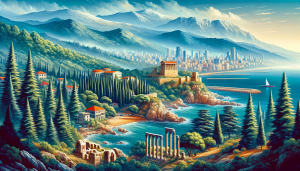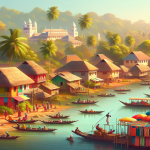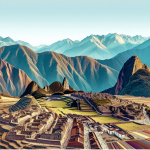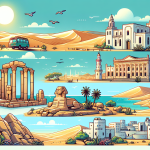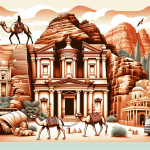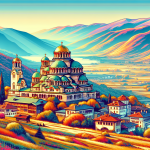Exploring the Diverse Beauty and Rich History of Lebanon
Lebanon, a small yet remarkably diverse country located on the eastern shore of the Mediterranean Sea, promises an unforgettable blend of cultural richness, historical significance, and natural beauty. Known as the “Switzerland of the Middle East,” Lebanon is a land where ancient history meets modern vibrancy. Within its borders, you can find Roman ruins, centuries-old churches and mosques, and bustling cities brimming with life. Whether you are an avid historian, a nature enthusiast, or a food lover, Lebanon has something to offer everyone. In this article, we will delve into the wonders of Lebanon, exploring its key attractions, hidden gems, and offering tips to make the most of your visit to this fascinating destination.
Historical Significance and Ancient Ruins
The Roman Ruins of Baalbek
A visit to Lebanon is incomplete without exploring the ancient Roman ruins of Baalbek. Located in the Beqaa Valley, Baalbek is one of the most well-preserved Roman archaeological sites in the world. The grandeur of the Temple of Bacchus and the Temple of Jupiter will leave you awestruck. These temples are a testament to the architectural prowess of the Romans and offer a glimpse into the religious and cultural life of ancient times. The site is a UNESCO World Heritage site, and rightly so, as it stands as one of the most impressive Roman structures outside of Rome.
Byblos – One of the Oldest Continuously Inhabited Cities
Byblos, known locally as Jbeil, is a city that traces its origins back to 5000 BC, making it one of the oldest continuously inhabited cities in the world. Walking through the cobbled streets of Byblos, you can almost feel the weight of history. The ancient harbor, Crusader castle, and Phoenician temples are just a few of the historical attractions that await you. Byblos is also a UNESCO World Heritage site and offers a unique blend of history and modernity, with bustling souks and lively bars and restaurants.
Natural Beauty and Outdoor Adventures
The Stunning Cedars of God
Lebanon’s natural beauty is epitomized by the Cedars of God, an ancient forest that has been a symbol of the country for centuries. These majestic trees, some of which are believed to be over 1,000 years old, are located in the Kadisha Valley. The Cedars of God are not only a natural wonder but also hold significant cultural and historical importance, having been mentioned in various religious texts. Hiking through this forest is a serene experience that connects you with nature and history.
The Beaches of the Mediterranean Coast
Lebanon’s Mediterranean coastline offers some of the most beautiful beaches in the region. From the bustling beach clubs of Batroun and Jounieh to the more secluded spots in Tyre, there is a beach for every kind of traveler. The crystal-clear waters and golden sands make for a perfect day of relaxation or water sports. Many of these beaches are also home to vibrant nightlife scenes, with beach bars and clubs offering a lively atmosphere after the sun sets.
Culinary Delights
Lebanese Cuisine – A Feast for the Senses
No visit to Lebanon would be complete without indulging in its culinary delights. Lebanese cuisine is renowned for its flavorsome dishes that combine fresh ingredients with aromatic spices. Staples such as hummus, tabbouleh, and baba ghanoush are just the beginning. A traditional Lebanese meal often includes a variety of mezze (small dishes) followed by grilled meats, fresh seafood, and delectable desserts like baklava. Dining in Lebanon is not just about the food; it’s an experience that embodies the country’s rich culture and hospitality.
Wine Tasting in the Beqaa Valley
Lebanon boasts a wine-making tradition that dates back thousands of years. The Beqaa Valley, with its fertile soil and favorable climate, is the heart of Lebanese wine country. Visiting the vineyards and wineries in this region is a must for any wine enthusiast. You can tour the cellars, learn about the wine-making process, and, of course, sample some exquisite wines. The Beqaa Valley is home to some of Lebanon’s most renowned wineries, such as Château Ksara, Château Musar, and Château Kefraya.
Vibrant Cities and Cultural Experiences
Beirut – The Paris of the Middle East
Beirut, the capital city of Lebanon, is often referred to as the “Paris of the Middle East” due to its vibrant cultural scene and cosmopolitan atmosphere. The city offers a mix of modernity and tradition, with high-end shopping districts, trendy cafes, and nightclubs alongside historical sites and museums. The Beirut National Museum and the Sursock Museum are must-visits for history and art enthusiasts. The Corniche, a seaside promenade, is perfect for a leisurely stroll while enjoying stunning views of the Mediterranean. Beirut’s nightlife is legendary, with countless bars, clubs, and live music venues ensuring that the city never sleeps.
Tripoli – A City of Contrasts
Tripoli, Lebanon’s second-largest city, offers a stark contrast to the modernity of Beirut. Known for its medieval Mamluk architecture, Tripoli boasts a rich history that is evident in its old souks, mosques, and citadel. The Tripoli Citadel, also known as Citadel of Raymond de Saint-Gilles, offers panoramic views of the city and the sea. The bustling souks are a sensory delight, with the aroma of spices, the sight of colorful textiles, and the sounds of busy traders. For a sweet treat, don’t miss out on trying Tripoli’s famous sweets, such as baklava and knefeh.
Hidden Gems and Off-the-Beaten-Path Destinations
Jeita Grotto
The Jeita Grotto, a system of two interconnected limestone caves, is one of Lebanon’s most spectacular natural attractions. Located just a short drive from Beirut, the grotto features stunning stalactites and stalagmites that have formed over millions of years. The upper cave can be explored on foot, while the lower cave is accessible by a boat ride through an underground river. The Jeita Grotto was a finalist in the New 7 Wonders of Nature and is a must-visit for any nature lover.
Qadisha Valley
The Qadisha Valley, also known as the Holy Valley, is a UNESCO World Heritage site that offers breathtaking natural beauty and historical significance. The valley is dotted with ancient monasteries and hermitages, some of which date back to the early Christian era. Hiking through the Qadisha Valley provides a serene experience, with the opportunity to explore these historical sites while surrounded by stunning landscapes. The valley is also home to the town of Bcharre, the birthplace of the famous Lebanese poet Khalil Gibran.
Anjar
Anjar is a unique archaeological site that offers a glimpse into the Umayyad period of Lebanese history. Located in the Beqaa Valley, Anjar was founded in the 8th century and features well-preserved ruins of a once-thriving city. The site includes the remains of palaces, mosques, and a sophisticated water system. Anjar is a UNESCO World Heritage site and provides a fascinating look at the architectural and cultural achievements of the Umayyad dynasty.
Travel Tips for Visiting Lebanon
When planning your trip to Lebanon, keep the following tips in mind to make the most of your visit:
- **Best Time to Visit**: The best time to visit Lebanon is during the spring (April to June) and autumn (September to November) when the weather is mild and pleasant.
- **Language**: Arabic is the official language, but English and French are widely spoken, especially in urban areas.
- **Currency**: The Lebanese Pound (LBP) is the local currency, but US dollars are also widely accepted.
- **Safety**: While Lebanon is generally safe for tourists, it’s always advisable to stay updated on travel advisories and exercise common precautions.
- **Local Etiquette**: Lebanese people are known for their hospitality. It’s customary to greet people with a handshake or a kiss on the cheek, depending on the level of familiarity.
- **Transportation**: Public transportation options are limited, so consider renting a car or hiring a private driver for convenience.
Lebanon is a country that captivates the hearts of those who visit, offering a unique blend of history, culture, and natural beauty. From the ancient ruins of Baalbek and Byblos to the vibrant streets of Beirut and the serene landscapes of the Qadisha Valley, there is something for everyone to enjoy. Whether you are exploring its historical sites, savoring its culinary delights, or simply soaking in the Mediterranean sun, Lebanon promises an unforgettable experience. So pack your bags and get ready to discover the wonders of this remarkable country.
For more information on travel destinations and tips, visit Travel + Leisure.
